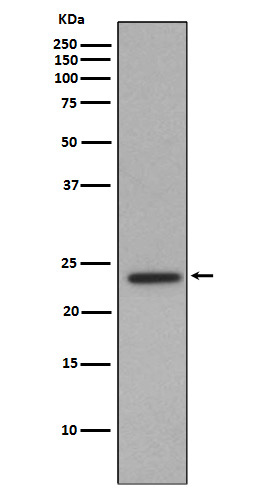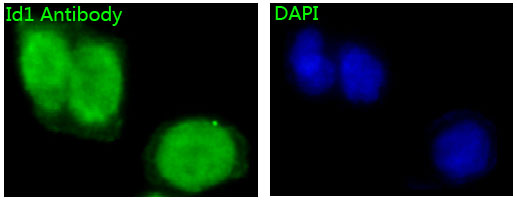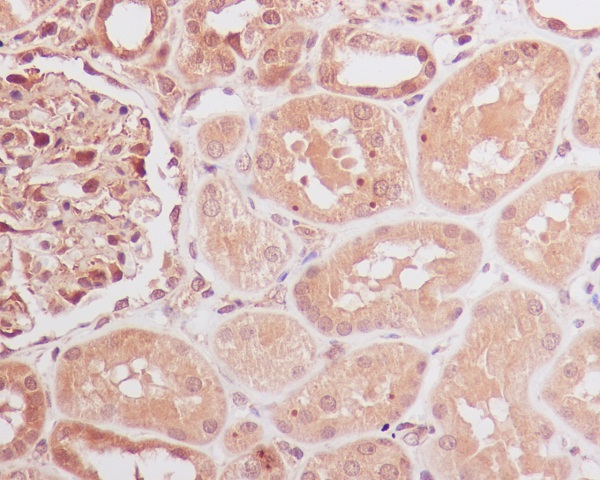


| WB | 咨询技术 | Human,Mouse,Rat |
| IF | 咨询技术 | Human,Mouse,Rat |
| IHC | IHC:1/100-1/200;IHF:1/50-1/200 | Human,Mouse,Rat |
| ICC | 1/50-1/200 | Human,Mouse,Rat |
| FCM | 1/20-1/100 | Human,Mouse,Rat |
| Elisa | 咨询技术 | Human,Mouse,Rat |
| Aliases | DNA-binding protein inhibitor ID-1; Class B basic helix-loop-helix protein 24; bHLHb24; Inhibitor of DNA binding 1; ID1; BHLHB24; ID;ID1 |
| WB Predicted band size | Calculated MW: 16 kDa ; Observed MW: 22 kDa |
| Host/Isotype | Rabbit IgG |
| Antibody Type | Primary antibody |
| Storage | Store at 4°C short term. Aliquot and store at -20°C long term. Avoid freeze/thaw cycles. |
| Species Reactivity | Human,Mouse,Rat |
| Immunogen | A synthesized peptide derived from human ID1 |
| Formulation | Purified antibody in PBS with 0.05% sodium azide,0.05% BSA and 50% glycerol. |
+ +
以下是关于Id1抗体的3篇参考文献的简要信息:
1. **文献名称**: "Inhibitor of DNA binding 1 (Id1) regulates tumor angiogenesis in glioblastoma"
**作者**: Ling, M.T. et al.
**摘要**: 该研究利用Id1抗体检测了胶质母细胞瘤中Id1蛋白的表达水平,发现Id1通过调控VEGF信号通路促进肿瘤血管生成,抑制Id1可减少血管密度并延缓肿瘤生长。
2. **文献名称**: "Id1 is a key regulator of breast cancer metastasis via EMT suppression"
**作者**: Gupta, P.B. et al.
**摘要**: 研究通过免疫组化(Id1抗体)发现Id1在乳腺癌转移过程中抑制上皮-间质转化(EMT),高表达Id1与患者生存率改善相关,抗体阻断实验表明Id1可作为潜在治疗靶点。
3. **文献名称**: "Id1 maintains embryonic stem cell self-renewal through BMP signaling pathway"
**作者**: Zhang, Y. et al.
**摘要**: 该研究使用Id1抗体进行蛋白质定位和功能分析,发现Id1通过激活BMP/Smad通路维持胚胎干细胞的自我更新能力,敲低Id1会导致干细胞分化标志物上调。
*注:以上文献信息为示例性内容,实际文献需根据具体数据库(如PubMed、Google Scholar)检索确认。*
The Id1 (Inhibitor of DNA Binding 1) antibody is a crucial tool for studying the Id1 protein, a member of the helix-loop-helix (HLH) transcription factor family. Id proteins lack a DNA-binding domain and function as dominant-negative regulators of basic HLH (bHLH) transcription factors by forming non-functional heterodimers with them. Id1 is implicated in diverse cellular processes, including cell cycle progression, differentiation, angiogenesis, and apoptosis. Overexpression of Id1 has been linked to tumorigenesis, metastasis, and poor prognosis in cancers such as breast, prostate, and glioblastoma, due to its role in promoting cell proliferation and epithelial-mesenchymal transition (EMT).
Id1 antibodies are widely used in research to detect and quantify Id1 expression in tissues or cells via techniques like Western blotting, immunohistochemistry (IHC), and flow cytometry. They are essential for exploring Id1's involvement in developmental biology, stem cell maintenance, and cancer progression. Commercially available Id1 antibodies are typically raised in rabbits or mice, targeting specific epitopes within the Id1 protein. Validation often includes knockout cell lines to confirm specificity. Recent studies focus on Id1's role in tumor microenvironments, therapy resistance, and as a potential therapeutic target. Reliable Id1 antibodies remain vital for advancing our understanding of its regulatory mechanisms in health and disease.
×